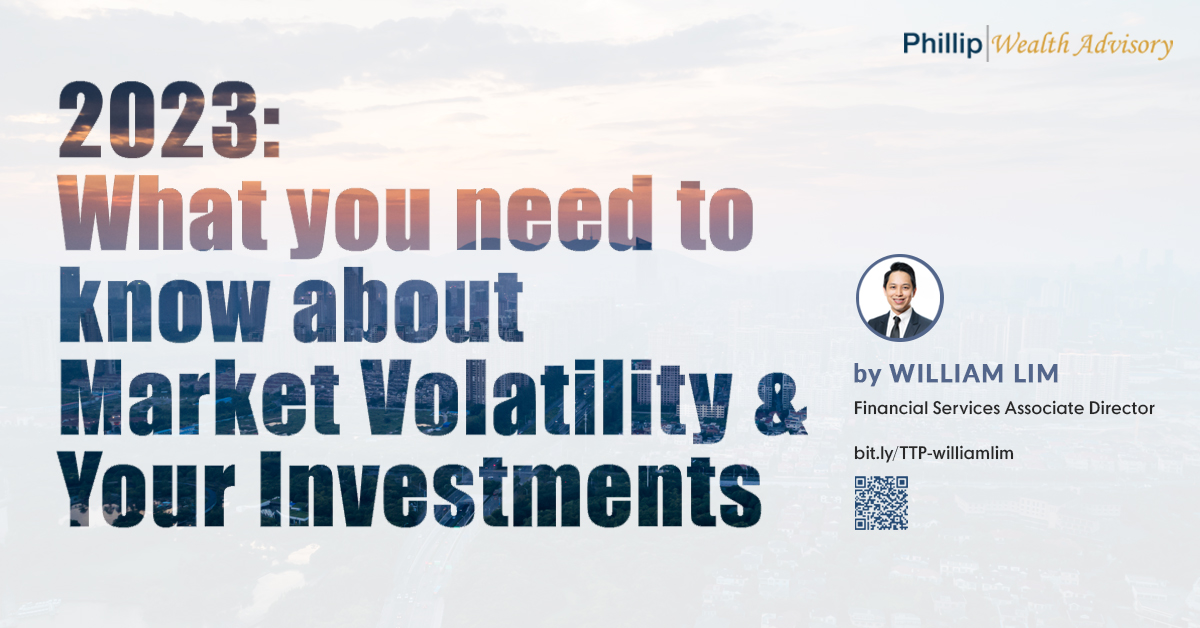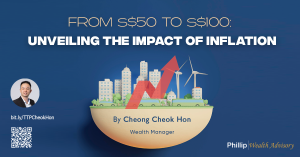2023: What you need to know about Market Volatility & Your Investments March 28, 2023

The S&P 500 finished 2022 with a 18.1% loss, marking the 7th worst loss since the 1920s. The bonds market also had one of its worst years in history. Since the 1920s, there has only been one double-digit calendar year loss for the 10-year US treasuries, yet in 2009, there was a 11.1% loss. In 2022, the US government bond benchmark was down by more than 15%, making it the absolute worst year for the bonds market.
A 60/40 portfolio of US stocks and bonds was down by more than 16% in 2022, marking it the 3rd worst year for diversified portfolios. If you had skin in the game, 2022 possibly would have been one of the worst and toughest years an investor could ever experience.
Going into 2023, the Federal Reserve officials are committed to fighting inflation, expecting higher interest rates to remain in place until more progress is made. Weighing down on investor sentiments is mainly a two-pronged policy risk. First, the Fed does not keep rates high so as to allow inflation to fester, like what was experienced back in the 1970s. Second, the Fed keeps restrictive policies in place for an extended period of time, hampering the economy ‘too much’.
Market uncertainty can naturally cause panic and lead to poor investment decisions. Here are five tried and tested tips that can help you gain perspective and better your assessment and make better investment decisions:
1. Maintain Your Long-Term Focus
Over the years, investors who have remained disciplined and focused on their long-term investment plans have been well rewarded for their patience.
A study done by Dalbar in 2018 examined the average returns achieved by investors across a 20-year period found that while most tried to time the market, they have significantly underperformed the market index. Over that period, the average investor has underperformed a simple, indexed 60/40 portfolio by 3.5% annually.
History has repeatedly shown that time in the market is the primary driver for investment growth.
2. Dollar-Cost Averaging
When you automate investing a fixed dollar amount on a regular basis, it is a built-in discipline that can help you avoid second guessing your long-term plan. In the face of volatility-induced stock and index declines, dollar-cost averaging offers an opportunity for long-term investors to reduce their average share cost. Dollar-cost averaging is when you invest the same amount of money in a particular security recurring over a certain period of time, regardless of price. If the price of the security declines, your same monthly investment can buy a greater number of shares.
3. Don’t Put All Your Eggs in One Basket
Diversification is a technique that mixes different types of investment asset classes in a portfolio in a bid to lower correlation risk. By including investments that react differently to various economic and market events, the gains of some asset classes will help to offset losses in others.
Asset allocation, on the other hand, is the act of dividing your investments among different assets such as stocks, bonds and cash. How each investor divides the pie is largely unique to his/her financial goals and risk appetite.
Therefore, it is crucial to further diversify within each asset class. For example, if you are investing in the bond market, do ensure that your bond portfolio is not entirely concentrated in just one specific area, the US treasuries, for example.
4. Have Cash on Hand
It is ideal to have sufficient cash in your savings account to cover for 6 to 12 months of your expenses (exact amount would depend on your personal situation). This emergency fund will help you tide past in an unfortunate event of a job loss or an unexpected expense like a large medical bill, reducing the risk of needing to sell stocks at a low point.
Savings accounts are now offering better rates than we have seen in the last decade, with some as high as 4%. Although the former might seem extremely attractive, we advise investors to take a conscious effort to pay down as much of your higher-interest debt, such as credit cards and car loans. The goal is to reduce as many financial stressors as possible when markets turn volatile, so that you are less likely to fall prey to your emotions, averting possible impulsive, poor financial decisions.
5. Review & Rebalance
Rebalancing is the process of buying and selling assets in your portfolio to maintain your asset allocation. For example, you want to have a portfolio that is 60% stocks and 40% bonds. If the stock market experienced a major change such as a 20% decline in 2022, investors’ portfolios might tilted away from their planned allocations, with equity allocation dropping below 60%. The aim here is to bring your equity allocation back to 60%.
Rebalancing your portfolio is important because the weightage of each asset class changes over time, altering the risk profile of your portfolio. It is a prudent to ensure that your portfolio is composed in a manner that adheres to your investment strategy and risk profile.
Rebalancing your portfolio will help maintain your original asset-allocation strategy, giving you the flexibility to make changes to your investing style when necessary or desired. Essentially, rebalancing will help you to stick to your investing plan, regardless of what the market does, and maintain your risk tolerance levels.
Remember that market volatility comes and goes. When you are armed with a properly diversified, long-term portfolio and anchored in a comprehensive financial plan, you feel more confident in staying on track towards achieving your long-term goals. Seeking out the help of financial professionals to partner you for the long haul, can further help to ring fence and review your financial plan, navigate rough waters with you, and ultimately achieving your investment goals together.
Contributor:

William Lim
Financial Services Associate Director
Phillip Securities Pte Ltd (A member of PhillipCapital)
https://bit.ly/TTP-williamlim
Disclaimer
These commentaries are intended for general circulation. It does not have regard to the specific investment objectives, financial situation and particular needs of any person who may receive this document. Accordingly, no warranty whatsoever is given and no liability whatsoever is accepted for any loss arising whether directly or indirectly as a result of any person acting based on this information. Opinions expressed in these commentaries are subject to change without notice. Investments are subject to investment risks including the possible loss of the principal amount invested. The value of the units and the income from them may fall as well as rise. Past performance figures as well as any projection or forecast used in these commentaries are not necessarily indicative of future or likely performance. Phillip Securities Pte Ltd (PSPL), its directors, connected persons or employees may from time to time have an interest in the financial instruments mentioned in these commentaries. Investors may wish to seek advice from a financial adviser before investing. In the event that investors choose not to seek advice from a financial adviser, they should consider whether the investment is suitable for them.
The information contained in these commentaries has been obtained from public sources which PSPL has no reason to believe are unreliable and any analysis, forecasts, projections, expectations and opinions (collectively the “Research”) contained in these commentaries are based on such information and are expressions of belief only. PSPL has not verified this information and no representation or warranty, express or implied, is made that such information or Research is accurate, complete or verified or should be relied upon as such. Any such information or Research contained in these commentaries are subject to change, and PSPL shall not have any responsibility to maintain the information or Research made available or to supply any corrections, updates or releases in connection therewith. In no event will PSPL be liable for any special, indirect, incidental or consequential damages which may be incurred from the use of the information or Research made available, even if it has been advised of the possibility of such damages. The companies and their employees mentioned in these commentaries cannot be held liable for any errors, inaccuracies and/or omissions howsoever caused. Any opinion or advice herein is made on a general basis and is subject to change without notice. The information provided in these commentaries may contain optimistic statements regarding future events or future financial performance of countries, markets or companies. You must make your own financial assessment of the relevance, accuracy and adequacy of the information provided in these commentaries.
Views and any strategies described in these commentaries may not be suitable for all investors. Opinions expressed herein may differ from the opinions expressed by other units of PSPL or its connected persons and associates. Any reference to or discussion of investment products or commodities in these commentaries is purely for illustrative purposes only and must not be construed as a recommendation, an offer or solicitation for the subscription, purchase or sale of the investment products or commodities mentioned.
About the author
William Lim
Financial Services Associate Director
Phillip Securities Pte Ltd (A member of PhillipCapital)
William Lim, is the Team Director of Steward Wealth- a team of 10 Financial Specialists who specialise in investment portfolio solutions at PhillipCapital. William adopts investment strategies under his professionally managed Unit Trust wrap accounts & 2 discretionary managed accounts with total assets under management (AUM) amounting to 60 million. William emphasizes on performance-based client solutions, portfolio construction using multifactor risk analysis, and incorporating both fundamental & quantitative approaches.
Prior to joining PhillipCapital, William spent 6 years as a Senior Relationship Manager under privileged banking and has won several awards during his tenure. He is also a frequent speaker on investment strategies.

 How to select a unit trust
How to select a unit trust  Introduction to unit trust
Introduction to unit trust  Back in Business: The Return of IPOs & Top Traded Counters in March 2024
Back in Business: The Return of IPOs & Top Traded Counters in March 2024  From $50 to $100: Unveiling the Impact of Inflation
From $50 to $100: Unveiling the Impact of Inflation 









